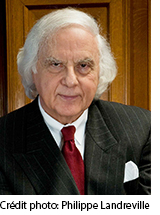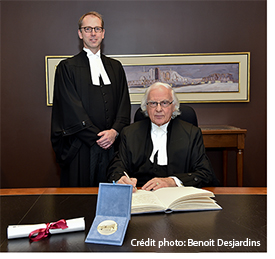The Honourable Morris J. Fish, c.r.
Mr. Justice Morris J. Fish: The Judge with the Golden Pen
By Mélanie Dugré, lawyer

A passion for writing
Once enrolled at McGill University, Morris Fish was struck by the gap in social classes. While his fellow students, who came from wealthy families, spent their summers travelling around Europe, young Morris worked as a bellboy at a hotel in the Laurentians. Envious of the future that awaited his classmates and eager to discover the wide world for himself, he sent an audacious letter to the editor-in-chief of The Montreal Star, Walter O’Hearn, offering his services as a foreign correspondent. Though his offer was politely declined by the daily, he was invited to a meeting with Mr. O’Hearn, where the two men embarked on a vigorous discussion of a constitutional issue. On this same occasion, Justice Fish met Paul Leduc, a municipal affairs reporter, who asked him to attend a speech by the Mayor of Montreal and then write an article. That was all it took for the newspaper to offer him a full-time summer job as a reporter and a part-time job during the school year.
Justice Fish first received a B.A. (with Distinction) from McGill University, followed by a B.C.L. (with First Class Honours) in 1962 from McGill’s Faculty of Law, where he was a University Scholar and was elected Permanent Class President. Upon completing law school, he was awarded the Greenshields Prize, the Crankshaw Prize for Highest Standing in Criminal Law, and the Macdonald Travelling Scholarship. In 1962-1963, he went to France to pursue doctoral studies in Constitutional Law and Public Liberties at the Université de Paris. During that time, he continued working as a field reporter for The Montreal Star, covering various international events.
Called to the Bar of Quebec in 1964, Justice Fish was subsequently admitted to the bars of Prince Edward Island (in 1968) and Alberta (in 1974). He was first an associate (1964-1967) and then a partner (1967-1989) in the Montreal law firm of Cohen, Leithman, Kaufman, Yarosky & Fish (and successor firms). Always a language and writing enthusiast, Justice Fish refused to give up The Montreal Star after being called to the Bar despite the strict rules of the professional order, which at that time forbade lawyers from simultaneously working in fields unrelated to law. Shielded by the anonymity of newspaper’s editorials, he wrote opinion pieces under various pseudonyms, including Robin Arthur, a name inspired by the first names of a niece and nephew. In February 1970, one of his articles, which roundly condemned a letter sent to defence lawyers by the Chief Crown Prosecutor with the support of the Chief Justice, stirred up controversy. In that letter, the prosecutors advised that due to a backlog in the courts, the accused parties, who were insisting on having a trial by jury and refused a trial by judge alone, would have their right to be released on bail revoked. In an impassioned editorial, Justice Fish condemned this new rule, pointing out that the law does not oblige accused persons to relinquish their freedom in order to exercise their right to request a trial by jury. The discussions intensified, and a committee was struck to examine the matter at the request of the President of the Bar, Jacques Viau, who, unaware that Justice Fish had written the editorial, invited him to participate in the committee’s work in his capacity as a defence attorney. At a meeting held jointly with the Chief Justice, the latter forthrightly asked Justice Fish if he was the author of the editorial. With deference, wisdom and a smile on his face, Justice Fish simply answered that editorials remain anonymous, but that incidentally, he totally agreed with the content.
An educator at heart
Teaching was always a high priority in Mr. Justice Morris Fish’s career. As an Adjunct Professor in the Faculty of Law at McGill University, he taught Criminal Evidence and Procedure (1973 to 1980) and Advanced Criminal Law (1986 to 1989). From 1971 to 1974, he gave a course on economic crimes at the Faculty of Law of the University of Ottawa, and from 1969 to 1971, a course on criminal law at the Université de Montréal. Over the years, he has contributed to a number of legal periodicals and been a guest speaker at many legal and judicial conferences, both in Canada and abroad. Justice Fish says he is greatly impressed by the intelligence and bright minds of students both present and past, and by the educational environment. While the practice of law has inevitably helped shape the judge and decision maker he has become, he remains passionate about the theory and principles of law, a factor that undoubtedly played a role in his appointment to the Court of Appeal of Québec in 1989.
Some 1,914 cases came before Justice Fish during his tenure on the Court of Appeal from 1989 to 2003. One of the first, of which he retains a vivid memory, involved having to determine whether bankruptcy interrupts or suspends prescription.
Having last heard the word bankruptcy as a university student nearly 25 years prior, Justice Fish began questioning experts at the Court, only to reach a quick conclusion that their analyses and answers were all over the map and ultimately contradictory. This case ‒ and many thereafter – brought Justice Fish to the realization that certain legal mysteries thought to be clear and resolved, in fact remain unresolved, which only makes the legal profession all the more fascinating and stimulating.
The temptation faced by public inquiry commissions
Over the course of his career, Justice Fish has served as a consultant to the Federal Department of Justice, Revenue Canada, and the Law Reform Commission of Canada, as well as special counsel to the Québec Commission of Inquiry on the Construction Industry (the “Cliche Commission”) and the Security Intelligence Review Committee. Of the Cliche Commission and various subsequent commissions of inquiry, Justice Fish says there is sometimes the temptation to bend the recognized rules in legal matters in order to collect evidence that will allow criminal charges to be laid against the players in a given industry. He acknowledges having felt this pressure himself during his work on the Cliche Commission, although he always considered it essential that the rules of administering criminal justice be followed. Justice Fish stresses the pertinence of commissions of inquiry in the context of legislative reform, while recommending caution because they do not constitute appropriate vehicles within the inquiry process in criminal matters.
As social involvement is a fundamental value for Justice Fish, he also sat on the Board of Directors of the Legal Aid Office of Montreal (1968-1973) and was the Chair and a member of various committees at the Bar of Montreal and the Bar of Quebec (1969-1976), as well as chair of the Quebec Rhodes Scholarship Selection Committee (2000, 2003 and 2006) and member (1994- ) and Chair (1996-2003) of the Advisory Board of the Faculty of Law at McGill University.
A decade of landmark cases
During Justice Fish’s term on the Supreme Court of Canada from 2003 to 2013, nearly 700 cases came before his bench, some of them highly controversial. Among others, he heard the cases concerning same-sex marriages, prostitution, the Charkaoui affair, and supervised drug-injection sites. His preferred causes obviously concerned an accused person’s right to silence and right to counsel. He recalls the case of one man who had been pushed to the limits after repeating 18 times that he refused to speak. Morris Fish points out with a touch of irony: “It seemed that we had reached the point where No meant Yes.”
Proud to rekindle ties with the Bar of Montreal

When asked to conclude with some words of advice to his colleagues at the Bar of Montreal, particularly the young generation of lawyers who are embarking on their careers, Justice Fish encouraged them to develop their talents and skills in areas of personal interest and to follow their hearts when choosing their speciality. He urged them to learn from mentors, while reminding them to remain true to themselves, not to copy a style or personality unsuitable to themselves because, as he explained, we can only reach our full professional potential by remaining true to who we are.
Given the trend among some lawyers to align themselves too closely with the cases of clients with whom they have friendly ties, Justice Fish stressed the need to draw certain boundaries, bearing in mind that a lawyer’s role consists of protecting his or her client’s interests, but strictly within the legal means available and always by maintaining a safe distance.
Always with a twinkle in his eye, Justice Fish, who is now practicing as Jurist in Residence with the law firm of Davies, has a very keen mind and subtle sense of humour, as evidenced in his article, “The Effect of Alcohol on the Canadian Constitution,” first written for a university course and later reissued in the McGill Law Journal in September 2001. The Journal discusses cases (including the famous Roncarelli affair on the rule of law) that have influenced the development of Canadian constitutional law. With a brief nod to his modest roots and to the doubts he once had about his career choice, Justice Fish stresses with a smile in his voice, that life is full of surprises and that the “misguided sometimes achieve beyond expectations.”
Showing great interest in the issues currently facing our legal system, Justice Fish underscores the importance of ongoing collective efforts to promote access to justice, not only in society’s interest, but also in the interests of the survival of an independent Bar. The diversity of the Bar of Montreal and its traditions has always been a great source of pride for Morris Fish. He concludes with the following: “I am a son of the Bar of Montreal. For a time, life led me along other paths, but after many decades away during which I grew up, grew older and grew wiser, I am now very happy to return to the fold. Having gone from being a son, to a father, and now a grandfather of the Bar of Montreal, I have returned to my roots to embark on a new phase of my career.”
